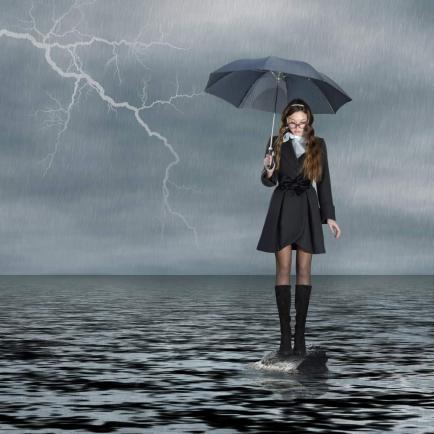
One morning in December, 2007 I was jolted awake by our Tsunami warning radio. Our 110-year-old house was vibrating. The winds were raging well over 100 mph. My husband and I jumped to action, dressing and grabbing backpacks filled with three days worth of supplies, matches, sleeping bags and flashlights. When we opened the door to the house we realized that we were in trouble. The road was blocked off with piles of debris. The sound of the ocean only a block away was ominous.
We threw our gear into our 4-wheel drive vehicle and crawled over branches and falling pine trees. Shingles and parts of our neighbors' homes battered our car as we crossed two rivers to get to higher ground. When we arrived at our destination (a family member's home), the power was out, it was cold and we all listened in the dark to hundreds of giant trees snapping and breaking like bombs exploding in the screaming winds.
It was almost 48 hours before the winds stopped and our town could survey the damage. It looked like a giant hand had swept across the mountains shearing pine trees off. Homes were missing shingles and had trees laying on them. The power was out, the roads were so filled with trees our little community was cut off for three days. 5,000 people spread across our small town and most of us couldn't drive ten feet before hitting a tree and in some cases a 30 foot pile of trees. No one could get in or out, all remote phones and cell phones didn't work. No one outside knew what was happening. There was no Tsunami, angry seas had ripped out early warning buoys.
It was at this moment that our town had its finest hour. I am pleased to say that in the week without power, Seaside Oregon took care of its own. Not even the Governor could get here. A helicopter couldn't fly overhead. All roads in and out were littered with trees and closed despite round-the-clock work for three days. It was a complete blackout of news and information for us and for those outside and it was the dead of winter.
In a disaster as you watch the news, you hear about government agencies helping and people waiting for a rescue from officials. We learned that you cannot sit back and wait for help. When disaster strikes, it may be cold or you may have children and need heat and food immediately. As soon as we could we gathered by neighborhoods and churches. This is a list of what we learned and did to support each other:
-
Your neighbors are your rescue team. Work together.
-
Do not wait for a rescue. Store food, water and fuel for at least three months if possible. Keep enough for three days in a back pack in the event you have to evacuate.
-
Store extra medicine, fuel and a way to cook food and boil water.
-
Gather at local churches, community centers and police stations as soon as possible to make a plan. You and your neighbors may only have each other for several days.
-
Community centers and churches cooked on gas stoves that worked without power and created heated sleeping centers for the elderly or those in need.
-
In emergency situations, local clergy sends groups out to check on the elderly and infirmed. It's important to know about the elderly in your area, especially those who are on oxygen or dialysis. Have a plan in place to keep them supplied durring a long-term power outage,
-
Store supplies for pets or farm animals.
-
Organize your resources, who has hot water or generators and who has food. People stayed in groups at homes with fireplaces and food and cooked outside on camp stoves.
-
When power is out, many newer appliances cease to function. When purchasing gas fireplaces, water heaters or stoves, find out if you can use them without power. My home had functioning gas powered hot water. People came to my home to shower and do dishes.
-
Telephone land lines worked when nothing else did. My rotary dial phone was the only one able to call out.
-
Move large frozen items that will thaw anyway into the fridge to keep smaller items cool. Keep ice blocks in your freezer to move to the fridge and keep the door closed as much as possible.
-
Store water, bottled or in barrels. The water supply wasn't safe. It is too late to buy it after the disaster hits.
-
If you live near water, store food and water upstairs or as high as possible.
-
Keep cash on hand and fuel. We could get gas at one station with a hand pump if we had cash.
-
Own a generator.
-
Work together. Amazingly there was no looting and violence, people of all walks of life worked together.
-
Keep a positive attitude. The children saw the experience as a fun adventure because adults laughed and smiled. It became a giant sleepover for my teenage daughter as the girls gathered around our fireplace.
There are many websites to help you prepare, including:
-
http://www.doctorprepper.com
-
http://www.lds.org/topics/emergency-preparedness
After a week without power, we realized we were more prepared than we thought. Our community now talks about it with a smile, like a team or family, we prevailed. (http://en.wikipedia.org/wiki/GreatCoastalGaleof2007) We survived it and we came together. Share this article with your neighbors, and create a neighborhood plan, I hope you never have to use.

